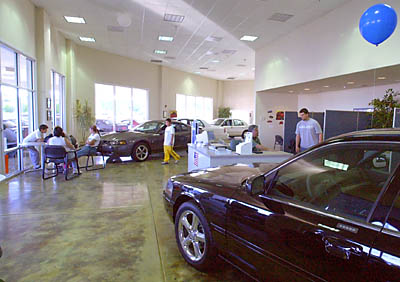Even though they’re competitors, they have joined to send a
message to auto buyers:
”
Get a better deal and keep the tax money in town and at
home.
”
Local auto dealers are in the midst of a campaign to impress
upon prospective buyers that looking for a vehicle in a larger city
isn’t going to guarantee them a better price.
Even though they’re competitors, they have joined to send a message to auto buyers: “Get a better deal and keep the tax money in town and at home.”
Local auto dealers are in the midst of a campaign to impress upon prospective buyers that looking for a vehicle in a larger city isn’t going to guarantee them a better price.
“People can get just as good of a deal here,” said Marty Greenwood, managing partner with Greenwood Chevrolet in Hollister. “We’re more likely to bend over backwards for people.”
Although local buyers make up most of their business, local dealers do see people buying out of the area, which isn’t in the county’s best financial interests. With the county’s sales tax at 7.25 percent, the sales tax on a $35,000 vehicle purchase is $2,537.50, Greenwood said.
According to the county’s 2002 Overall Economic Development Program, auto dealers and suppliers accounted for $56.8 million in retail taxable sales in 2000. The figure increased to $64.1 million in 2001 and accounted for $4.65 million in sales tax revenue, with the majority of it going to the state.
Al Martinez, executive director of the Economic Development Corporation, said many people shop for vehicles in cities that have a lower sales tax, but those shoppers don’t realize that the amount of sales tax they pay is determined by where they live, not where they buy the vehicle.
Auto dealers in San Benito County have battled for years to keep buyers looking locally for their purchases, Martinez said. He said dealers are “always fighting the competition” from areas such as Gilroy and Salinas.
Greenwood Chevrolet, Hollister Pontiac Buick GMC and Tiffany Ford Mercury jointly took out an advertisement in early March to inform consumers about “the truth” behind car pricing. A common misconception buyers have, they said, is that big-city dealers pay less for their cars, mostly because they buy cars in bulk. The local dealers said that’s not true.
“People don’t perceive that they can get a good deal in a small town,” Greenwood said. “The reality is that we all pay the same price for cars.”
Bob Tiffany, general manager of Tiffany Ford Mercury, agreed.
“It’s an inaccurate perception. People think if they go to a big city or high-volume dealer, the dealer can buy cars for less because they buy in bulk,” Tiffany said. “It’s wrong, but it’s a perception people have. It is understandable.”
Tiffany said all dealers pay the same price when they buy vehicles from their franchises. However, the dealer mark-up varies from dealer to dealer based on overhead costs, which include salaries and benefits, cost and size of land, the size of inventory, rent and cost of storing the inventory, Greenwood said.
“We all have smaller overheads,” Greenwood said. “We have less personnel, less land, cheaper land and lower interest on the amount of inventory we keep.”
Martinez said another battle exists because it can be difficult for small-town dealerships to compete with big-city dealers, whose “TV commercials are always running.” But local dealers are combating this with more aggressive advertising and increasing their inventories, Tiffany said.
And the plan may be working. Tiffany said he’s seen an increase in the number of people coming from outside the area to buy vehicles because they think smaller dealers will have lower prices. And as the area has grown, Hollister has been put on the map, he said.
“We want to let people know we’re here. We’re not whining,” Greenwood said. “It hurts to see other people’s (license) plate frames in our community.”










